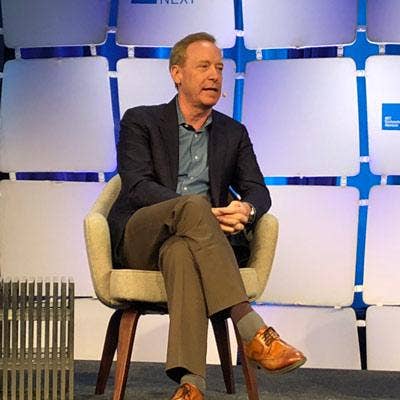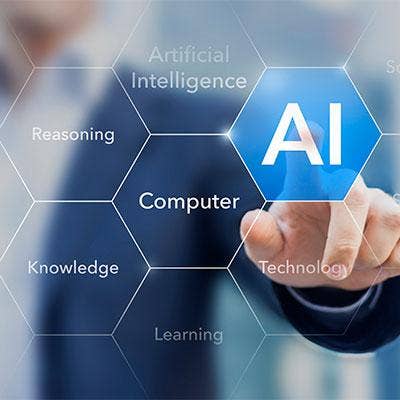Microsoft President Smith On The GitHub Acquisition, Regulating AI And What Jobs Will Be Automated Next

Smith On The Record
As a top executive at one of the largest companies in the tech industry, Microsoft President and Chief Legal Officer Brad Smith has been spending a lot of time thinking through how technological advancements are changing society -- both for better and for worse. The arrival of powerful artificial intelligence technologies, including some developed by Microsoft itself, is accelerating the automation of jobs while also posing major ethical questions, Smith said Tuesday during MIT Technology Review's EmTech Next conference in Cambridge, Mass. Smith offered a wide-ranging discussion during the conference both about Microsoft's latest moves and the impacts of tech innovation on society as a whole.
AI Stealing Jobs
Smith said society is at a point where humans need to give serious thought to what our "comparative advantage" is to artificial intelligence. Machines have "surpassed" humans in areas such as speech recognition and vision recognition, he said. "I think an interesting exercise is, predict the job that is first going to be eliminated by artificial intelligence. My prediction would be the job of taking a person's order at the drive-through in the fast food restaurant," Smith said. "Because what does that job involve? Well basically, it's two tasks -- listening to someone speak, so that one can understand the speech, and entering their order in a computer."
If the computer can effectively understand the person placing the order, then the order will have been automatically entered into the system, he said. "I would guess that in three to five years, we probably will go through drive-throughs but be talking to computers rather than people," Smith said.

Regulating AI
The arrival of super-intelligent machines could lead to new laws and government regulation, Smith said. "I think we need a path that will enable governments, especially in the democratically elected countries of the world, to ensure that we're all on an appropriate path," he said. "Ultimately, I do believe that in our future there will be AI law and AI regulation. We've never lived in a world where we thought it was appropriate for government to legislate ethics on every question. But we do expect that on certain issues of such ethical importance -- can you rob, can you kill -- no, we legislate on those issues ... And as we endow machines with the power to do things that previously could be done only by human beings, I think it's perfectly appropriate to expect governments to ensure that laws apply to what these machines can do."

An Hourly Wage For The Uber Economy?
Smith said that the use of "platform tools" that have spawned large numbers of contractors has meant that many workers are no longer guaranteed a minimum wage. This is a major concern, he said. "I just don't think fundamentally we want to take the country to a position where we have millions of people using these wonderful platform tools and earning $1.99 an hour for their work," Smith said. "And I think we're going to need to create the kinds of features and tools that will enable governments or other responsible businesses to be able to measure and ultimately ensure what people get paid, on some kind of appropriate hourly basis."
Broadband Access
Smith said another technology-related issue that is "not getting sufficient attention across the country" is the lack of access to broadband in many communities. He compared the importance of broadband to utilities that the government guarantees access to, such as electricity and water. There are 20 million people in rural communities "that we are literally leaving behind," Smith said. Government and industry in the U.S. "have to do a better job in addressing this," Smith said.

GitHub Acquisition
On Monday, Microsoft announced an agreement to acquire open source code repository GitHub in a deal valued at $7.5 billion. More than 28 million developers use GitHub to share code and work together on open source projects, and Smith said the acquisition -- expected to close by the end of the year -- will generate new responsibilities that Microsoft's leadership is taking seriously. The acquisition could accelerate a "transformation" in Microsoft's relationship with the developer community, Smith said. "I think for anybody who's followed either open source or Microsoft -- or especially the connections between the two -- it's been an enormous journey for Microsoft over 15 years. Yesterday we in effect became the important stewards for developers and open-source developers around the world," Smith said. "And that is yet another important responsibility that we need to add to the kinds of things we really focus on addressing."